7 Worst Battery Life-Guzzling Gadgets
Sign up to receive The Snapshot, a free special dispatch from Laptop Mag, in your inbox.
You are now subscribed
Your newsletter sign-up was successful
There is a disturbing trend in the gadget world, and it's that laptop, tablet and phone makers aren't taking battery life seriously enough. Yes, having touch on a Windows 8 notebook is great, but not if the computer lasts an hour and a half less than one without that capability. And what good is a smartphone with an HD display and superfast processor if you have to plug it in around lunchtime? We run our homemade battery test, which involves continuous Web surfing at 40 percent brightness, on every device we review. And if the endurance isn't good enough, regardless of the gadget's other features, we simply won't recommend it.
Here are seven of my worst battery life offenders and how much you'll pay per hour of juice versus more efficient competitors.
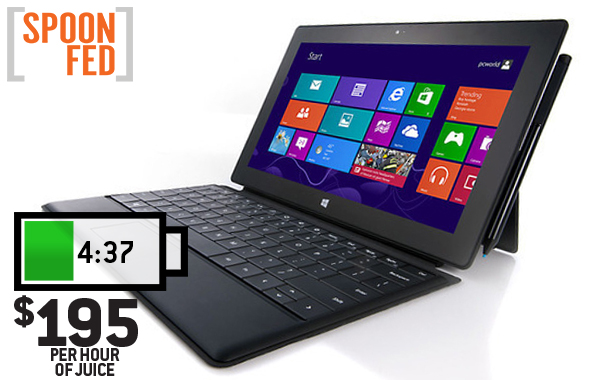
Microsoft Surface Pro ($899)
Battery Life: 4:37Cost Per Hour of Juice: $195 per hour You know it's a bad sign when the top tech story in Google News is that you might be offering an external battery for your product. Despite its Core i5 power and the ability to run both desktop and Windows Store apps, we don't recommend the Surface Pro because its 4 hours and 37 minutes of battery life completely undermines its portability. The average ultraportable laptop lasts about an hour and a half longer. And while the iPad isn't as versatile, it lasted 12 hours and 22 minutes on our battery test. That's 2.5X the endurance. If you opted for the $799, 128GB iPad, that works out to $64 an hour of juice, compared to $195 per hour for the Surface Pro.
More: Microsoft Surface Pro Review
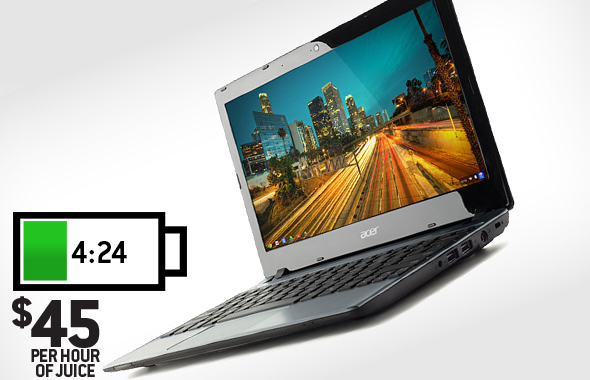
Acer C7 Chromebook ($199)
Battery Life: 4:24 Cost Per Hour of Juice: $45 per hour Lets take a look at two Chromebooks with around the same price: the Samsung Series 3 Chromebook ($249) and Acer C7 ($199). Both devices sport 11-inch displays, but the ARM-powered Chromebook lasted 7:34, while the C7 lagged more than 3 hours behind at 4:24. Granted, the C7 isn't designed to be your primary PC, and maybe you will use it mostly around the house. But why would you pay $45 per hour of battery life for the Acer when, for just $50 more, you can get the much more efficient, $33-per-hour Samsung Chromebook? The Series 3 also happens to sport a sleeker design.
More: Acer C7 Chromebook Review
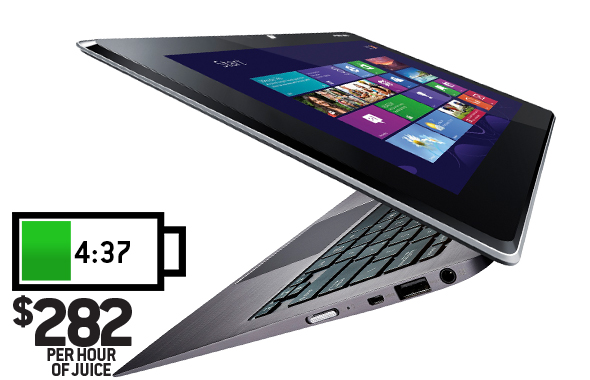
ASUS Taichi ($1,299)
Battery Life: 4:37 Cost Per Hour of Juice: $282 per hour One of the most innovative Windows 8 hybrids of the year is also one of the most disappointing. Almost everyone who sees the ASUS Taichi, which has a second screen on the back of its lid, can’t help but say, “Wow.” All you have to do to transform this 11.6-inch wonder from clamshell to tablet mode is shut the lid. While we wish both displays offered touch capability (just the outside one does), my biggest complaint is the lack of staying power. In laptop mode, the device lasted 4 hours and 37 minutes, and with just the touchscreen active, we saw only 3:37. The average ultraportable laptop lasts 1.5 hours longer. While it’s bigger, the $1,199, twelve-inch Dell XPS Duo lasted 5:46, translating to a much better efficiency rating of $206 per hour.
Sign up to receive The Snapshot, a free special dispatch from Laptop Mag, in your inbox.
More: ASUS Taichi 21 Review
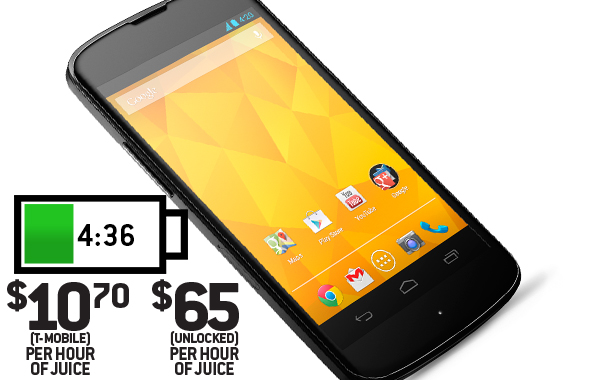
Google Nexus 4 ($49 for T-Mobile, $299 Unlocked)
Battery Life: 4:36 Cost Per Hour of Juice: $10.70 per hour for T-Mobile, $65 Unlocked If you want a pure Google experience, the unlocked Nexus 4 is the smartphone to buy. You get the latest Android 4.2 Jelly Bean software, a nifty Photo Sphere camera and absolutely no ugly skins. Too bad the 2100 mAh battery inside this handset lasted only 4 hours and 36 minutes on our battery test. Even when you consider the cheap, limited-time-offer price of $49, you’ll still have to deal with a device that lasts 1.5 hours less than the average Android phone. The $49 HTC One VX lasted 6:58 on our test, good for a $7 per hour efficiency rating.
More: Longest-Lasting Smartphones
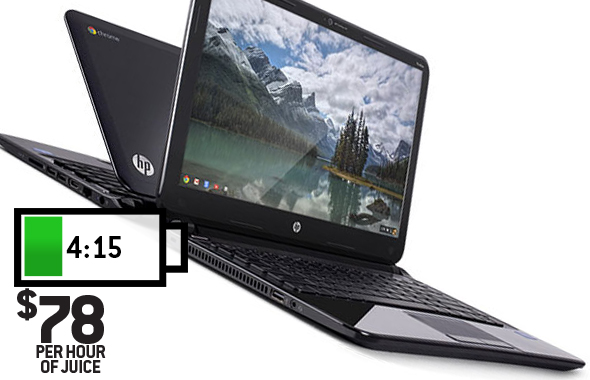
HP Pavilion Chromebook ($329)
Battery Life (Rated): Up to 4:15Cost Per Hour of Juice: $78 per hour We give HP credit for being transparent about the battery life it expects out of its Pavilion Chromebook. The company says “up to” 4 hours and 15 minutes via the 4-cell battery. Even if the system lives up to that not-so-lofty number, it will lag way behind the Samsung Chromebook’s score of 7:34. Granted, HP’s Chromebook has a much larger, 14-inch display, but it also costs $80 more for something you can’t use for very long away from an outlet. Put another way, you’ll pay $78 per hour of endurance, versus $33 per hour for the Samsung. That’s nearly a 2.5X premium.
More: HP Pavilion Chromebook Costs $329 for 4 Hours Battery Life
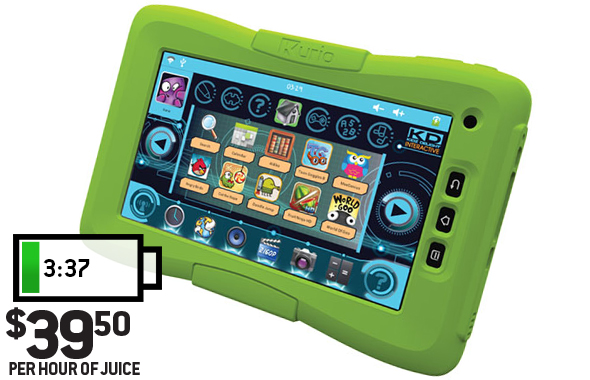
Techno Source Kurio Tablet ($149)
Battery Life: 3:37 Cost Per Hour of Juice: $39.50 per hour You might have heard of the Kurio 7 tablet, because it's targeted directly to families. This $149, Android-powered device lets you create multiple child profiles with ease, as well as restrict screen time and Web surfing. Parents can also choose to whitelist only the apps they want Junior to use. But what good is a kids' tablet if it runs out of gas in just 3 hours and 37 minutes? That works out to $39.50 per hour. The $199 Amazon Kindle Fire HD lasted 7:34 (or $26 per hour), and it has a parent-friendly FreeTime mode. And the $199 Fuhu Nabi 2 didn't conk out until 8:05 ($24.50 per hour).
More: 10 Tablets to Buy and Avoid
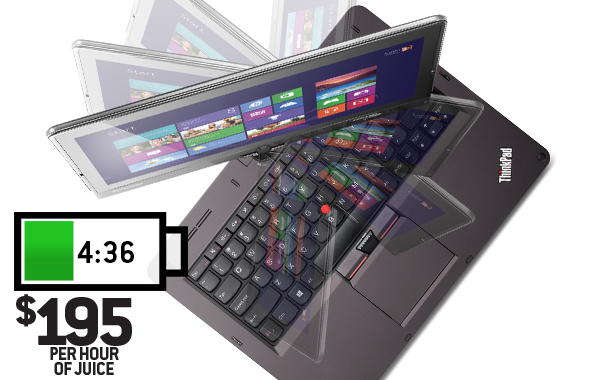
Lenovo ThinkPad Twist ($899)
Battery Life: 4:36Cost Per Hour of Juice: $195 per hour Here's a twist on the Windows 8 convertible you should probably avoid. The 12.5-inch ThinkPad Twist combines a swiveling touchscreen with one of the better keyboards you'll find. We especially like the stand mode for giving presentations. Just make sure you're near an outlet. On our battery test, the Twist died after 4 hours and 36 minutes. The average ultraportable notebook lasts 6:01. Although it has a slightly larger display, Lenovo's own IdeaPad Yoga lasted a much longer 6:18. In efficiency terms, the $899 Twist would cost you $195 per hour of juice, compared to $182 per hour for a $1,159 Yoga outfitted with a much faster 128GB SSD. That's an easy call in my book.
More: Lenovo ThinkPad Twist Review
Editor-in-chief Mark Spoonauer directs LAPTOP’s online and print editorial content and has been covering mobile and wireless technology for over a decade. Each week Mark’s SpoonFed column provides his insights and analysis of the biggest mobile trends and news. You can also follow him on Twitter and Google+.
- 10 Laptops with the Longest Battery Life
- Short Battery Life Sinks First Windows 8 Notebooks
- 10 Tablets with the Longest Battery Life

